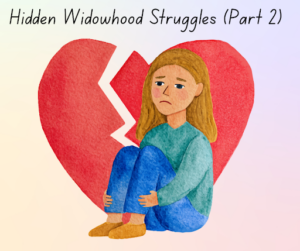There are a lot of terms and phrases that are associated with grief and the grief process. Some are used well, and some are misused very frequently. This fact often gives us so much to write about in our blog. For example, in order to discuss death, we use the terms passed, they are in a better place, deceased, at rest, departed, no longer with us, transitioned, etc. This list goes on and on and evokes a lot of emotion.
In referring to our partner, we often use the term late. We actually often wonder about why we call them late when they have passed. It is not like they are going to be here anytime soon, let alone late. They are simply not coming….they can’t. Yet, late is the term we use. What is even worse is when someone refers to our spouses as our ex. What the….?!???!!!? They are definitely not our exes. So, we use the term late,…no matter how that makes us feel.
One of the many grief struggles is dealing with sympathy and empathy. There is a difference, and it can be a subtle one that can increase or decrease our struggles. Sympathy is feelings of pity or sorrow about someone else’s misfortune. Empathy is to understand and share the feelings of another. The key word is to understand, as in deep understanding of one’s grief and what they are going through.
Recently, Jeni had a discussion with someone who works in the grief community about the concept of the terms sympathy and empathy. This person had a wonderful way to relate to these terms, and we wanted to share that here today.
She stated that when she was working with someone who had lost a parent, she could empathize with that person as she had also lost a parent. She had walked in their shoes and personally knew the emotions and feelings associated with that type of loss. She also understood what losing a parent might be like for them. However, when she was working with someone who lost a spouse, she could only sympathize with that person as she had not experienced that type of grief.
So, while someone may be grieving a loss, if they have not grieved your specific loss, they can only sympathize with the situation. They can empathize when they have suffered the same type of loss.
This revelation for both of us has been very freeing. It provides a new way to respond to those who want to compare their situations with ours. Yes, they may be suffering grief from a divorce, lost pet, or other lost relative or friend. We can understand and sympathize with their situation, and we can realize that this comparison is their way of sympathizing with us. Transitioning our response from one expecting empathy to one receiving sympathy can help us in our conversations with others who have not suffered the same type of loss.
While we can find comfort and a deep understanding without words among the widow community, we truly do not want others to have to join us. Even so, we can be empathetic with each other and the journey that we are all traveling. We all know the path all too well and it does help to have others who understand exactly where we are, even when we are at different points of the journey.
We hope that this helps you in your conversations with others. This can also help us to empathize and sympathize with others as they encounter their own losses.
Please contact us and let us know of any grief struggles or topics you’d like us to explore. We appreciate your support and input.
Peace & blessings,
Jeni & Teresa
PS: For additional support, you can download our free copy of 10 Ways to Move Forward After Loss
Torn in Half: The First Days as a resource for the first days after a loss – available on Amazon in paperback and ebook.
Follow us on Social Media:
Facebook: https://www.facebook.com/TornInHalfwidows/
LinkedIn: https://www.linkedin.com/company/torn-in-half/




